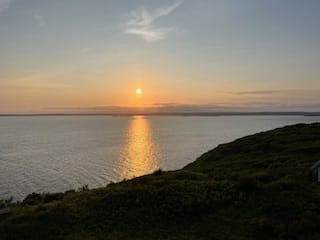
From our vantage point, we see where the Kennebec River meets the ocean, and the wind and currents swirl the shades of blue and white in every direction. This view has changed little since the Western Etchemins plied these waters long before George Popham, Christopher Levett, or the French explorers arrived in the late 1500s and early 1600s. Historian Bill Haviland writes that Etchemin means “’real people’ as opposed to animals, monsters and other people.” They were coastal hunters and gatherers who fished the quinibequi for salmon, sturgeon and other anadromous fish and traded furs first with neighboring indigenous groups and later the Europeans. Writing in the early 17th century about the Etchemins, French Jesuit Priest Pierre Baird recounts, “from the month of May until mid-September, they are free from all anxiety about their food; for the cod are upon the coast and all kinds of shellfish.” He describes how they sometimes ventured beyond the shore to open water to harpoon whales.
Though people have asked and we have looked, to date we haven’t seen any whales or sharks. Father’s Day did bring an affable group of picnicking marine scientists specializing in sharks. They, like the post-blueberry-pancake family from Fiddler’s Reach and the folks cruising up from Yarmouth, took advantage of the sunny weather and fair seas to enjoy the newly cleared trails and sandy beach.
Today, a few days later, the whale adjacent theme continued when a new NOAA vessel speed monitoring system arrived for installation. Seguin will house the device which analyzes ship speed compliance in a conservation effort to reduce Right Whale collisions.
The marine bounty the Etchemins and early Europeans found off Seguin and environs has changed, but we still hear the fishermen who head out in their boats early most mornings in all weather and challenging visibility to catch what lies beneath.
Read more about the Western Etchemin and early Maine history in Emerson W. Baker’s “Trouble to the eastward: the failure of Anglo-Indian relations in early Maine”


